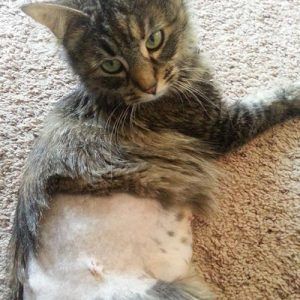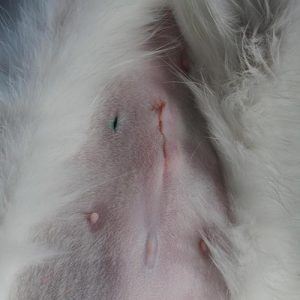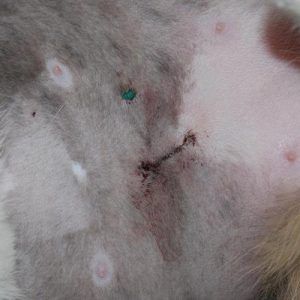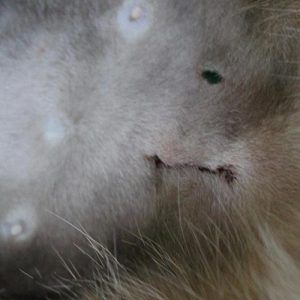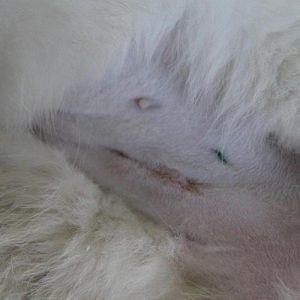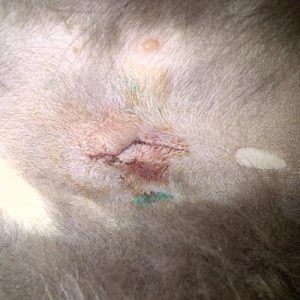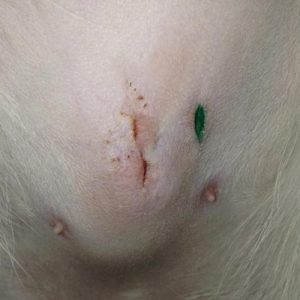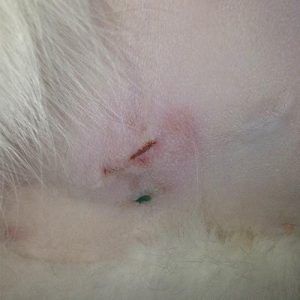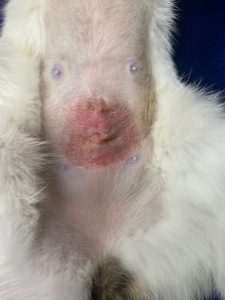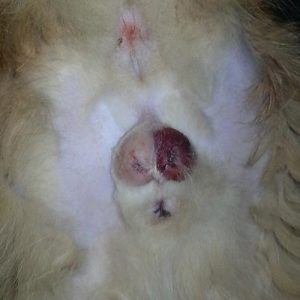Overview
Below you’ll find all of the information you need to prepare for postoperative care for your cat. We’ve also included frequently asked questions and related blog posts.
In general, Pets In Stitches will recheck your cat at no charge for complications resulting directly from surgery. There could be a charge for medications or an Elizabethan collar, if needed. Please be aware that some complications must be referred elsewhere. When in doubt, just give us a call text or send us a note and we will point you in the right direction.
Use these quick links to navigate to specific sections.
Spay or Neuter Care
Dr. Rastetter shares what all to expect in videos for males, females and free-roaming cats. In addition, please read the following:
- Please keep females that were in heat away from non-neutered males for two (2) weeks. While they are unable to become pregnant, they will still attract males. If a male attempts to breed the female, it can cause life-threatening damage to the female.
- Male cats can still impregnate a female cat for up to two months after surgery.
- Your cat will receive pain medication at the time of surgery and some to be administered at home in food.
General Care
- It is very important to limit your cat’s activity for the next seven (7) days. Keep your cat quiet in a cage or a small room like a bathroom. No running, jumping, or playing. If your cat is active, complications can occur such as failure of the internal sutures with life-threatening herniation or painful swelling at the surgical site. Isolate your cat from children and other pets.
- Your cat may or may not want to eat right away but should be eating by the morning after surgery.
- Your cat must be kept indoors to stay clean, dry and warm. Do not bathe your cat during the recovery period.
- Side effects of anesthesia include sleepiness, mild disorientation, and extreme response to normal stimuli. You cat may be a little agitated or aggressive due to the effects of anesthesia.
Incision Care
- Check the incision site daily for the next seven (7) days. Redness and swelling should be minimal but can occur for a few days after surgery. For females, apply ice to surgical sight for 10-15 minutes (as pet will allow) to help reduce pain and swelling.
- No suture removal is necessary since incisions are held together with dissolvable sutures or glue.
- There should be no drainage. Expect slight bleeding from the scrotum of a neutered male for the first 24 hours.
- Normal grooming will occur but do not allow your cat to lick excessively or chew at the incision. If this occurs, an Elizabethan collar must be used to prevent licking. This is considered self-trauma and Pets In Stitches will not cover your costs to treat complications such as surgical site destruction, infection, or swelling which can require emergency care.
- Male cats – Male cats do not have any sutures. If using clay litter, ask our staff about our Yesterday’s News litter alternative!
- Do not clean or apply topical ointment to the incision site.
Healing Process
The following photos are visual examples of what you should encounter after surgery and days after having your cat spayed or neutered. If you see anything that looks unusual or you are concerned about, please don’t hesitate to give us a call.
View Photos of Normal Male Cats
The following photos are visual examples of improperly healing surgical sites after having your pet spayed or neutered. If your pet surgery was performed at Pets In Stitches, please contact us if your pet’s incision looks like any of these pictures.
Frequently Asked Questions
What should I do to keep my dog/cat from licking his/her incision?
You may purchase a post-surgery collar or body suit from us.
Should I be worried that my dog/cat is licking his/her incision?
Yes. Please bring them in so we can check their incision. We are available for rechecks Monday, Tuesday, Thursday and Friday with an appointment or follow the emergency contact instructions on your Postoperative Care Instruction sheet.
What is the green mark on my pet?
A small tattoo is the best way to identify your pet has been spayed or neutered. It is standard procedure for sterilization surgeries.
What is the recovery period like?
The recovery period is seven to ten days. You need to restrict their activity and keep them indoors. You also want to watch their incision closely. We will give you Postoperative Care Instructions when you pick up your pet.
Do male cats need special litter boxes after neuter surgery?
Male cats should use Yesterday’s News, which Pets In Stitches does have available for purchase, instead of litter for two days after neuter surgery. This helps prevent irritation to the surgical incisions from litter dust particles.
Dental Care
General Care
- Please contact us immediately if you notice any of the following: pale gums, vomiting, diarrhea, labored breathing, or lethargy lasting for more than 24 hours.
- Feed as normal after surgery. Your pet might not want to eat right away but should be eating by the morning after surgery. Offering canned food or moistening dry food with water to soften can be helpful.
- Side effects of anesthesia include sleepiness, mild disorientation, and extreme response to normal stimuli. Your pet may be a little agitated or aggressive due to the effects of anesthesia. For this reason, we recommend isolating your pet from children and other pets.
- Your pet has received pain medication during the dental and, if extractions were performed, some to be administered at home.
Incision Care
- If your pet has extractions with sutures placed, check the incision sites daily for the next seven (7) days to make sure the incision edges haven’t separated. If a follow up appointment is needed, we will let you know at your pick up time.
- If extractions were performed, please feed soft food and no chew toys, rawhides, or mouth play for seven (7) days. Do not change your pet’s diet as it may cause GI upset. If your pet eats dry food, just soak dry food in warm water for half an hour.
- Dentals are very safe surgeries; however, complications can occur. Minimal discomfort should resolve within several days. If discomfort persists longer, please contact us.
What forms of dental surgery do you offer?
Routine scale and polish, extractions, excessive gum growth removed.
What forms of payments do you take?
We accept cash, credit cards or debit cards and Care Credit. We do not accept personal checks.
A 4% service fee is applied to all sales. We do offer a full discount on this service fee to customers who pay with cash.
Why can you provide surgical services at a cost less than most full-service practices?
Pets in Stitches is a streamlined practice. Unlike a private veterinarian who provides a full medical service, we are focused on one single service, i.e. quality surgeries. Pets In Stitches performs surgery along with basic vaccinations and testing only. With our singular focus, we can better maintain our overhead costs, making it more affordable.
If my pet is showing signs of illness, should I postpone surgery or vaccinations?
Please call us. Some conditions do not interfere with surgery and some do require surgery be delayed.
Use these quick links to navigate to specific sections.

